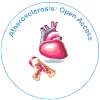Atherosclerosis and Lipid Lowering: is there a Need for New Agents?
Received: 15-Sep-2015 / Accepted Date: 10-May-2016 / Published Date: 17-May-2016
Editorial
Cardiovascular disease (CVD) is the leading cause of death worldwide. Among well-known risk factors, such as visceral obesity, sedentary lifestyle, metabolic syndrome, smoking, hypertension, age, gender, family history of heart attacks, diabetes, low levels HDL-C, high levels of LDL-C and total cholesterol are very strong predictors of CVD events and death[1-5].
In recent years, there have been significant advances in the elucidation of biomarkers of atherosclerotic disease, and also their pathogenesis, prevention and treatment. Atherosclerosis is a systemic inflammatory disease characterized by on-going progression in response to systemic risk factors and local pro-atherogenic stimuli that leads to acute myocardial infarction, stroke and lower limb ischemia [6].
An intriguing question is what is the real level cardio protective LDL cholesterol? Especially for patients with a history of heart attack, peripheral artery disease, or stroke: is 70 mg/dL, which is currently recommended or should go down to levels of 40 or 30 mg/dL?
Statins has substantially reduced CVD events around the world and is recommended as first-line therapy for CVD management. However, a need for other lipid-lowering agents, because some patients do not tolerate statins due to adverse events, or cannot reach LDL-C level desired because of high levels of LDL-C, or patients with very high risk cardiovascular events need more intensive reduction therapy [7-9]. Can we pay the benefits of these new agents when statins are effective and inexpensive?
Zhang et al. reported a meta-analysis study to evaluate the safety and efficacy of anti-PCSK9 antibodies in randomized, controlled trials (RCTs). Twenty-five RCTs encompassing 12,200 patients were included. The study showing largely no significant difference between anti-PCSK9 antibodies and placebo (or ezetimibe), except that alirocumab was associated with reduced rates of death (relative risk (RR): 0.43, 95 % CI: 0.19 to 0.96, P =0.04) and an increased rate of injection-site reactions (RR: 1.48, 95 % CI: 1.05 to 2.09, P =0.02); evolocumab reduced the rate of abnormal liver function (RR: 0.43, 95 % CI: 0.20 to 0.93, P =0.03), both compared with placebo. Evolocumab and alirocumab substantially reduced the LDL-C level by over 50%, increased the HDL-C level, and resulted in favourable changes in other lipids [9].
New agents, as well as prevention programs should be implemented in order to decrease the morbidity and mortality caused by atherosclerotic events.
References
- Oliveira GBF, Avezum A, Roever L (2015) Cardiovascular disease burden: evolving knowledge of risk factors in myocardial infarction and stroke through population-based research and perspectives in global prevention. Front Cardiovasc Med 2: 32.
- Roever L, Pinto IM, Chagas AC (2015) The association of left ventricular mass with coronary atherosclerosis and myocardial ischemia: cause and effect or simple association? Eur Heart J Cardiovasc Imaging 16: 156-157.
- Roever L, Resende ES, Diniz AL, Penha-Silva N, Veloso FC, et. al. (2015) Ectopic adiposopathy and association with cardiovascular disease risk factors: The Uberlândia Heart Study. Int J Cardiol 190: 140-142.
- Roever L, Veloso FC, Resende ES (2015) Visceral Fat, Atherosclerosis and Coronary Artery Disease. Intern Med 5:188.
- Roever L, Resende ES (2015) Coronary Microvascular Dysfunction. International Journal of Cardiovascular Sciences 28, 152-159.
- Koskinas KC, Windecker S, Raber L (2015) Regression of coronary atherosclerosis: Current evidence and future perspectives. Trends in Cardiovascular Medicine.
- Stone NJ, Robinson JG, Lichtenstein AH, Bairey MC, Blum CB, et al. (2014) 2013 ACC/AHA guideline on the treatment of blood cholesterol to reduce atherosclerotic cardiovascular risk in adults: a report of the American College of Cardiology/American Heart Association Task Force on Practice Guidelines. J Am CollCardiol 63: 2889-2934.
- Dadu RT, Ballantyne CM (2014) Lipid lowering with PCSK9 inhibitors. Nat Rev Cardiol 11: 563-575.
- Zhang XL, Zhu QQ, Zhu L, Chen JZ, Chen QA, et. al. (2015) Safety and efficacy of anti-PCSK9 antibodies: a meta-analysis of 25 randomized, controlled trials. BMC Medicine 13: 123.
Citation: Leonardo Roever (2016) Atherosclerosis and Lipid Lowering: is there a Need for New Agents?. Atheroscler open access 1:e102.
Copyright: © 2016 Roever L et al. This is an open-access article distributed under the terms of the Creative Commons Attribution License, which permits unrestricted use, distribution, and reproduction in any medium, provided the original author and source are credited.
Share This Article
Open Access Journals
Article Usage
- Total views: 14113
- [From(publication date): 3-2016 - Apr 25, 2024]
- Breakdown by view type
- HTML page views: 9680
- PDF downloads: 4433
